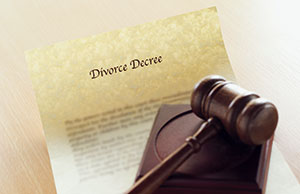Seventh District Holds Legal Separation Agreement With Final Property Division Terminates Spouses’ Rights to Elect Against Each Others’ Wills

The appeals court affirmed a ruling by the Mahoning County Probate Court that a legal separation agreement eliminated a surviving spouse's right to assert a spousal claim against the other's estate under state probate laws after she died in 2011.

The appeals court affirmed a ruling by the Mahoning County Probate Court that a legal separation agreement eliminated a surviving spouse's right to assert a spousal claim against the other's estate under state probate laws after she died in 2011.
The Seventh District Court of Appeals has ruled that where a married couple has entered into a court-approved legal separation agreement in which the spouses state their intention to fully and finally dispose of each party’s prospective property rights in the property of the other, the right of either spouse to elect to take against the will of the other is considered to have been relinquished unless the separation agreement expressly provides otherwise.
The court’s 3-0 decision, announced September 7, affirmed a ruling by the Mahoning County Probate Court that a legal separation agreement between spouses Jeffrey and Lisa Dragovich eliminated Jeffrey’s right to assert a spousal claim against Lisa’s estate under state probate laws after she died in 2011.
The case involved the interplay between a February 2010 judgment entry in which the Mahoning County Domestic Relations Court formalized the Dragoviches’ separation agreement, and R.C. 2106.01, a state probate statute that grants a decendent’s surviving spouse a right to claim a specified share of the deceased spouse’s estate even if the surviving spouse has been excluded from the decedent’s will. In April 2011, after the Dragoviches’ separation agreement was formalized, Lisa drew up a will conveying all of her property to her mother and two sisters, and specifically directing that Jeffrey was to receive nothing from her estate. Lisa died two weeks later.
After Lisa’s will was filed in probate court, Jeffrey filed a claim seeking a surviving spouse’s share of her estate pursuant to R.C. 2106.01. The probate court denied that claim based on a finding that, by entering into the 2010 separation agreement, Jeffrey had relinquished his right to assert any future claim against Lisa’s property, including her estate. Jeffrey appealed the probate court’s ruling to the Seventh District Court of Appeals. He argued that because the separation agreement made no specific mention of a surviving spouse’s right to take against a will under R.C. 2106.01, and that right is guaranteed by statute, the probate court erred by finding that he had “implicitly” relinquished a statutory right by signing the separation agreement.
Writing for the court of appeals, Judge Joseph J. Vukovich pointed to language in the couple’s separation agreement and judgment entry stating that the parties intended it to “settle and determine and hereby provide for ... the division of all property owned by the parties or either of them, real or personal, the payment of all liabilities of the parties or either of them, and all other benefits and privileges conferred and all obligations imposed on either of the parties by virtue of their marital relationship.”
Judge Vukovich wrote: “The right to elect against a will is one of the ‘benefits and privileges
conferred ... by virtue of their marital relationship.’ As such, we conclude that the
parties intended their separation agreement to fully and finally settle their prospective
property rights in the property of the other, and thus, the right to elect against the will
has been waived by the husband.”
In support of that legal analysis, Judge Vukovich cited two provisions of state law, R.C. 2107.33 (D) and (E), that address the closely-related situation in which a person who has made a will obtains a divorce, a marriage annulment or a legal separation, and that person dies without amending his or her will to eliminate bequests or grants of power over the decedent’s property to the former spouse. He noted that those statutes provide that 1) all provisions in the decedent’s will conveying property or power over the decedent’s estate to a former spouse are considered revoked unless the will expressly provides otherwise; and 2) property prevented from passing to an ex-spouse by such a revocation shall pass to the decedent’s other heirs as if the former spouse had died before the maker of the will.
He wrote: “Although not directly on point, these statutory provisions support our conclusion that the proper rule in this case is that where spouses actually separate, a legal separation agreement which intends to fully and finally settle their prospective property rights will revoke a surviving spouse’s right to elect against the will unless the agreement expressly provides otherwise.”
Judge Vukovich’s opinion was joined by Judges Cheryl L. Waite and Mary DeGenaro.
Dragovich v. Dragovich, 2012-Ohio-4114
Opinion: http://www.supremecourt.ohio.gov/rod/docs/pdf/7/2012/2012-ohio-4114.pdf
Civil Appeal From: Mahoning County Probate Court
Judgment Appealed From Is: Affirmed
Date of Judgment Entry on Appeal: September 7, 2012
Please note: Opinion summaries are prepared by the Office of Public Information for the general public and news media. Opinion summaries are not prepared for every opinion, but only for noteworthy cases. Opinion summaries are not to be considered as official headnotes or syllabi of court opinions. The full text of this and other court opinions are available online.
Acrobat Reader is a trademark of Adobe Systems Incorporated.


